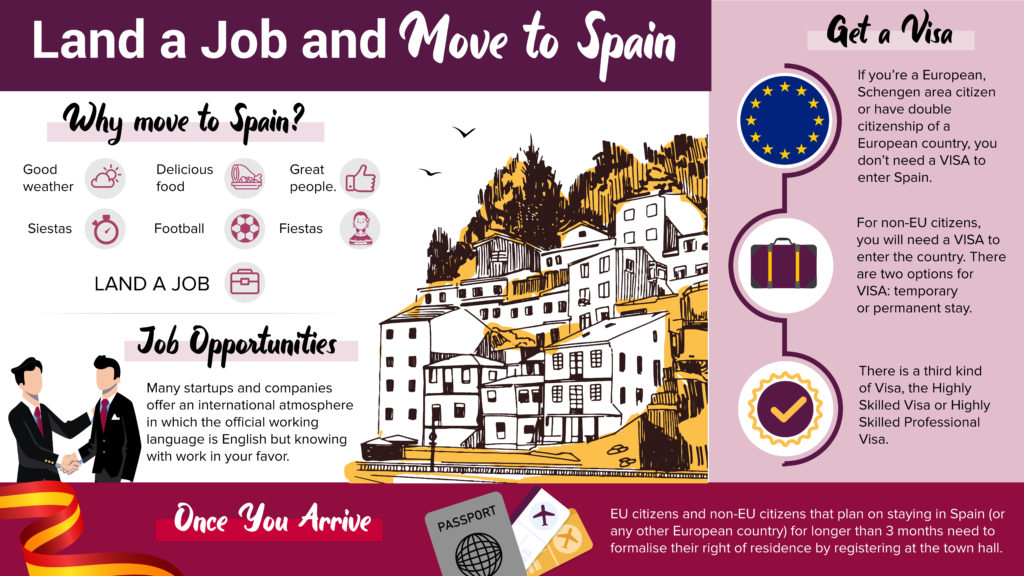Ready for Departure?
If you’re looking to expand the horizons and land a job in Spain, you’ve arrived at the right place. Are you from South America? Even better. In this post we will take you through all the requirements and processes you’ll have to go through, before, during and after your arrival.
Many of the countries in the European Union and Schengen Area have the same or very similar policies and laws when it comes to foreigners wanting to live and work in their country. This makes things a bit easier, but before relocating to another country make sure to check everything out. There’s a lot of information online, but also ask friends and friends of your friends. We also recommend visiting the embassy or consulate of the country you’re thinking of moving to. They will share with you all the information needed.
With this being said, it’s important to point out that this blog post is specifically for those wanting to move to Spain from a Spanish speaking South American country.
Let’s get to it! Or in Spanish, ¡vamos!
Before moving
In this part of the article, we will walk you through the things you need to consider before moving to Spain.
Why move to Spain?
Spain is globally known for its good weather, delicious food, and its people. If we go a little further we can also add football, siesta, and fiesta to the list. But aside from the fun part, which has to be considered, of course, Spain has become the place to be for new and not so new companies, and most importantly, startups.
Madrid and Barcelona are the two economic and commercial engines of the country. They are home to important companies such as FREE NOW, TravelPerk or even Adevinta in the Mediterranean city, and eDreams ODIGEO, in the capital. It’s also important to point out that Barcelona and Madrid sit on the 5th and 6th place in the ranking of European tech hubs.
Both cities have their perks, such as an international atmosphere and the big city vibe, but with that also come downsides, the high price of living being one of them.
For this reason, if you’re considering other cities in Spain we recommend: Valencia, Sevilla or Bilbao, just to name a few.
If you want some insights on the costs of living, from grocery shopping, housing, and even transportation, make sure to check out Numbeo.
Job opportunities
We will talk about the language advantage in the following section, but if you come from a Spanish speaking country, or you speak Spanish, it will work very well in your favour.
We live in a globalised planet, in which a lot of companies offer an international atmosphere. That is very positive because you get to meet people from all over the world. But it also makes it possible for professionals to work and communicate in English, without having to necessarily speak the official language of the country they are in from the get-go.

Photo by Brooke Cagle on Unsplash
Many startups and companies offer an international atmosphere in which the official working language is English.
Having a work contract before you move to Spain will make things a lot easier, especially when applying for a Visa. We recommend looking for jobs that offer VISA support.
If you’re looking for a tech job, at Landing.jobs we specialise in matching people with job opportunities across Europe’s greatest startups, firms, and companies.
Even though Madrid and Barcelona are the most famous cities, the tech startup scene is quite diverse and scattered across the country. Make sure to check out the job openings that we have at Landing.jobs, for Barcelona and Madrid.
The language/s: Spanish and co-official languages
One of the main reasons why you might have chosen Spain as your European destination is the language: Español. It might not sound like the most important matter, but believe us, it is. The fact that you’re travelling to a country that has Spanish as its official language will make bureaucratic things so much easier and, in some ways, faster. Aside from the paperwork, it will also be helpful when meeting people and getting started in your new workplace.

Speaking of the language, it’s interesting to mention that Español is the official language of the country, but some regions of the territory have co-official languages.
Starting with the northern regions, País Vasco (Basque Country), and some places of Navarra, you might encounter some locals that speak Vasco (Basque). Don’t worry if you don’t understand a word. Vasco is one of the oldest languages in the world and it has no ties with any Romance language.
Bordering Portugal in the south, the most western part of Spain is Galicia. Habitants of Galicia also speak Gallego (Galician), which co-lives with Spanish. If you happen to speak or know a bit of Portuguese, you will find a lot of similarities between Gallego and Portuguese.
Now to the eastern side of the peninsula. País Valencià, or Valencian Country in English, also has two official languages, Spanish and Valencià. Even though it’s not very spoken in the capital, Valencia, many locals do use it in the interior of the region. Small tip: don’t say that Valencià and Català are the same. Some locals might get offended.
Last but not least, Català (Catalan). Spoken by 7 million people, most of the people of Catalonia are bilinguals, meaning that they can switch easily from Spanish to Catalan. Out of all the co-official languages of Spain, Catalan is the most spoken one.
Don’t be scared though. Even though the languages mentioned above are co-official in their regions, if you speak Spanish you will not have any problem communicating with anyone, especially in the bigger cities. Spanish is the official language, and everyone that is native from Spain, speaks it. This being said, the locals might appreciate the gesture if you speak some words of either one of the languages mentioned above.
Since we’re talking about languages and cultures, it might be a good time to mention the political circumstances that Spain and Catalunya are going through. Explaining the whole situation would take a lot of history classes because the cultural differences between Catalunya and Spain go way back. But we are here to tell you that you don’t have to worry about not being safe.
You shouldn’t be scared to move to Spain or cross Barcelona out of your destination cities. It’s true that there is a political issue and manifestations happen from time to time, but Barcelona is a safe city and so is the rest of Catalunya.
Get a Visa
If you’re a European, Schengen area citizen or have double citizenship of a European country, you don’t need a VISA to enter Spain.
For non-EU citizens, you will need a VISA to enter the country. To kick-off the VISA process, you will need to go to the nearest embassy of Spain in your home country. There are two options for VISA: temporary or permanent stay.
There is a third kind of Visa, the Highly Skilled Visa or Highly Skilled Professional Visa. It’s especially for those professionals applying for highly qualified positions or those who have graduated from a prestigious university.

Photo by Agus Dietrich on Unsplash
The VISA process can be long and complicated, but it’s one of the most important steps.
Temporary stay
With this kind of authorisation one can reside in Spain from 90 days to 5 years. This VISA is the one that you should apply to work in Spain. Actually, one of the requirements to get it is a work contract.
In the case that you don’t have one (work contract), you will have to prove to the authorities that you have enough financial support in order to reside in Spain for a settled period of time. The temporary VISA can be renovated.
Long-period stay
This VISA authorises you to live in Spain like any other Spaniard. It is only given to someone that has lived in the country continuously for five years and meets the conditions established by regulation.
Highly Skilled Professionals
This is a Visa that enables non-EU citizens to live and work in Spain in a management or qualified role. For example, individuals who manage a large group of people in a company and/or professionals that work in very technical and specialized positions. If you have graduated from a prestigious business school or university, you might be eligible to apply for this permit as well.
For more information regarding this Visa, please visit the EU Immigration Portal. You can also check the Immigration Portal of the Ministry of Labour, Migration and Social Security of the Spanish Government (information is only available in Spanish).
We also recommend visiting the official page of Spain’s Foreign Affairs for more details regarding the Embassy of Spain in your country and everything about VISA processes.
Once you arrive
We hate to break it out to you like this, but after the VISA process, there’s still some paperwork to be done once you arrive in Spain.
Arriving in Spain (or any other EU/Schengen country)
EU citizens and non-EU citizens that plan on staying in Spain (or any other European country) for longer than 3 months need to formalise their right of residence by registering at the town hall.
There are some EU countries in which you have to report your presence upon arrival if you plan on staying in the country for less than three months. Spain is not one of them, though. You will have to report your arrival in the first three months.
In order to work, you will need a NIE (Número de Identidad del Extranjero), Fiscal Number for Foreigners. The government links the NIE number to the residence card and also to Seguridad Social (Social Security). For the NIE application you will need:
- Completed and signed original (not a copy) application form EX-15, which will be given to you at the police station. The official form will be given to you in Spanish, and to make things easier, here you can find the EX-15 form in English. This is just an example for you to see what the form looks like and what information it requires. This is not to be printed and filled out.
- Passport and photocopy.
You will also need an address. It doesn’t have to be permanent but it cannot be a hotel because it might be used for notification.
The NIE is issued by the National Police (Policia Nacional) and in some cities, like Valencia, you need to book an appointment beforehand.
With the NIE, you will be able to work, register in the Social Security, open a bank account and be able to access public services, amongst other things.
If you’re looking to give your tech career a boost we definitely recommend to take the brave step and move abroad. Not only it will be an amazing work experience, but it will also open your eyes and mind to a new country, new culture and most importantly, new people.
Aim for more,
Marketing Team @ Landing







0 Comments